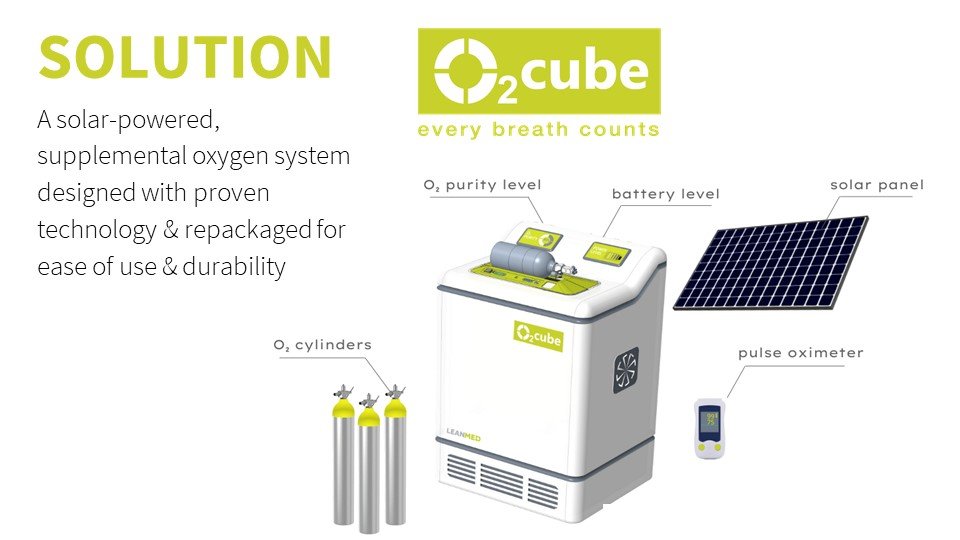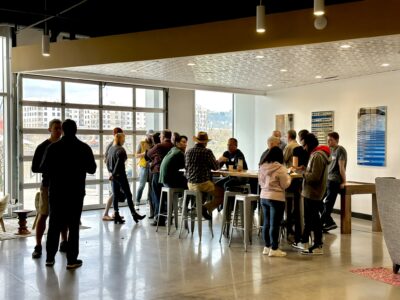Even before the COVID-19 pandemic accelerated demand for medical oxygen, there was an apparent need for devices that could produce air that’s fit to breathe in areas outside the electrical grid.
For LeanMed, the idea for such a device began when founder and then-University of Pittsburgh medical student James Newton went to Malawi and witnessed firsthand the difficulties rural health clinics face with oxygen shortages.
The Greensburg-based company is the creator of the O2 Cube, a solar-powered oxygen generator. The company, founded by Newton and helmed by CEO Mark Adkins, an adjunct professor in the University of Pittsburgh’s Swanson School of Engineering, includes a half-dozen other employees who graduated from the University of Pittsburgh, Duquesne University and Carnegie Mellon University.
The device is designed to address a widespread need around the world: According to the World Bank, only 4.1% of rural Malawians have access to electricity. Without electricity to produce supplemental oxygen, pediatric pneumonia can become fatal. Worldwide, pneumonia kills more children than any other infectious disease, and 99% of the 800,000 annual deaths occur in the developing world.
After his return to Pittsburgh, Newton approached Adkins, his professor at the time. Adkins has decades of experience bringing products to market. He saw the value in the technology and was familiar with what it takes to develop university-born technology for a wider market.

Mark Adkins. (Photo via LeanMed)
“There’s an entrepreneurial ecosystem within Pittsburgh,” he said. “And what we hope for in the case of Pittsburgh is we want to take student ideas, or even doctor ideas, and we want to create an environment where these ideas, if they have value, can come to market.”
In 2018, the team came in first place in Pitt’s Blast Furnace competition, and in 2019 it received funding from Idea Foundry, earning it $10,000 in both instances. In 2020, it finished 3rd place out of 70 applicants in Duquesne University’s New Venture Competition (DNVC).
Over the last two years, the COVID-19 pandemic has exposed and exacerbated society’s inequities, including the digital divide, food and housing insecurities, and of course, access to medical care.
In March, the O2 Cube was recognized by the World Health Organization and included in its “2021 Compendium of Innovative Health Technologies for Low-Resource Settings.”
Since COVID-19 accelerated the need for medical oxygen, the team fast tracked design and entered into a partnership with healthcare technology company Philips, for whom Adkins had previously consulted. The device licenses elements of the UltraFill Home Oxygen System, which Phillips discontinued near the end of 2018.
Details of LeanMed’s financials were not disclosed, nor were the details of its agreement with Phillips, but the arrangement allows LeanMed to more quickly produce prototype units while it seeks long-term funding for the fully-engineered, final commercial version.
“For us at Philips, we have been a developer of new products for those with various acute and chronic respiratory conditions and we are happy to work with a company with such a great mission to get oxygen to those in need,” said Sharon Baer, global marketing portfolio leader for sleep and respiratory care at Philips.
WHO provides feedback for each of the items in the compendium, and expressed concern that the unit has a need for spare parts, as well as if it could be produced locally in at-need communities. Currently, a single, fast track unit is on its way to a rural health clinic in Nigeria.
At the same time, LeanMed has launched a crowdfunding campaign in hopes of raising $500,000 to extend production of the oxygen delivery system to other areas in need.
Join the conversation!
Find news, events, jobs and people who share your interests on Technical.ly's open community Slack





